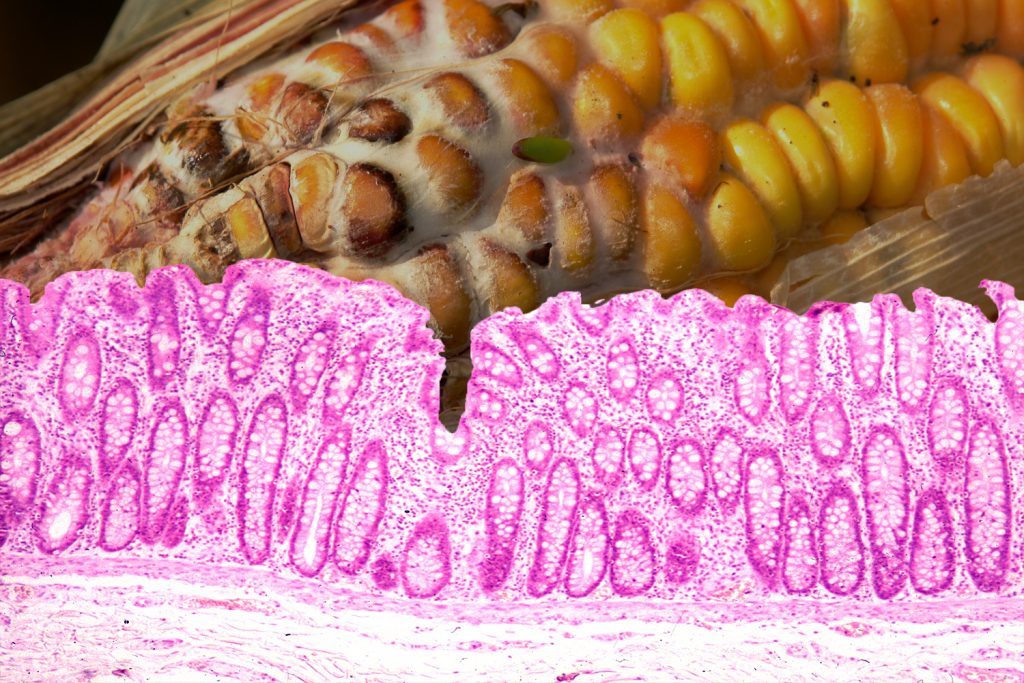19 Apr How mycotoxins impair the gut barrier function

Filamentous fungi or molds produce secondary metabolites called mycotoxins during crop growth, harvesting, storage and processing. Zearalenone (ZEA), deoxynivalenol (DON), ochratoxin A (OTA), aflatoxin B1 (AFB1), T-2 toxin and fumonisin B (FBs) are examples of common mycotoxins. They are widely found in feed materials and poultry feeds all over the world and cause acute and chronic poisoning in humans and animals.
The digestive tract is responsible for feed digestion, energy and nutrient absorption, immune response and elimination of waste products (feces). Because most of mycotoxins reach the interior of the animal’s body through feed, the intestinal mucosa is the first biological barrier of the intestine that faces the challenge of mycotoxin toxicity.
Mycotoxins impair four aspects of the gut barrier function
Effect of mycotoxins on the mechanical barrier function of the intestine
Mycotoxin damage will impair intestinal cells by oxidative damage and DNA damage. Bensassi and colleagues indicated that DON inhibited cell proliferation and induced DNA damage which could directly kill cells through an apoptotic process.
Tight junctions are critical to the attachment of epithelial cells, maintaining their structure. Mycotoxins can significantly reduce the expression of tight junction proteins like occludins and claudins.
Effect of mycotoxins on the intestinal chemical barrier function
The chemical barrier in the intestines is mainly composed of gastric acid, bile, various digestive enzymes, and bacteriostatic substances produced by intestinal parasites. Goblet cells secrete highly glycosylated mucin into intestinal lumen which forms the first line of defense against microbial invasion.
Studies have indicated that mycotoxins can change the composition of mucin monosaccharides in chicken intestines, which will affect mucin function. Besides, mycotoxins, even at low concentrations, can affect mucin mRNA expression levels and protein expression levels, damaging the intestinal mucosa and intestinal inflammation.
Effect of mycotoxins on the intestinal mucosal immune barrier function
Mycotoxins can both damage the humoral and cellular immunity of the intestinal mucosa.
AFB1 can reduce the mRNA expression levels of immunoglobulins, such as IgA, pIgR, IgM, and IgG in broilers. DON/FB1 reduce the IgG content in serum and lymphocyte proliferation in piglets.
Meanwhile, mycotoxins also could increase the secretion of pro-inflammatory factors, resulting in increased permeability of the intestines, making it easier for some toxic factors present in the gut to enter the bloodstream.
Effect of mycotoxins on intestinal mucosal biological barrier function
The resident intestinal flora that colonizes the surface of the intestinal mucosa forms a biological barrier in the intestines. If the balance of the intestinal microflora is broken, this may lead to numerous intestinal diseases, including diarrhea and enteritis.
A few studies have shown that mycotoxins can alter the intestinal microbiota:
AFB1 could induce changes in microbial community composition, and significantly decrease the content of some lactic acid bacteria.
DON exposure reshapes the intestinal microbial structure and completely disrupts the abundance of bacteria, leading to flora imbalance.
Conclusions
Mycotoxins contamination can cause damage to the intestinal barrier, which can lead to diseases and intestinal inflammation. Therefore, it is essential to control the content of mycotoxins in the feed and to add a mycotoxin binder during feed production.
Ms. Ruby Yu, Research & Development
Products of choice
BioShield© is a complete solution that protects your animals against toxicity by mycotoxins. It includes:
- Broad spectrum mycotoxin protection (silicates with mycotoxin binding function)
- Phytogenics that preserve liver health, safeguard gut health and activate the immune system.
PlusBind© is a mixture of carefully selected silicates intended for the prevention of diseases and productivity losses related to the presence of all types of mycotoxins. It is indicated in poultry, pigs, aquaculture and ruminants.
The silicates present in PlusBind© have a highly expandable molecular structure. This characteristic gives the product a wide surface available for the adsorption of mycotoxins and therefore allows a high effectiveness at lower doses (0.5-1 kg per ton of feed).
PlusBind© is a mixture of carefully selected silicates intended for the prevention of diseases and productivity losses related to the presence of all types of mycotoxins. It also contains plant extracts with prebiotic effect.
It is indicated in poultry, pigs and aquaculture.
The silicates present in PlusBind Bio© have a highly expandable molecular structure. This characteristic gives the product a wide surface available for the adsorption of mycotoxins and therefore allows a high effectiveness at lower doses (0.5-1 kg per ton of feed).
GrowthPlus© is added to feed to maintain and improve digestive health. It is formulated with synergistic ingredients:
- Bactericidal and fungicidal plant extracts, combined with organic acids for better effectiveness, that reduce the number of pathogenic microbes in the digestive system.
- Plant extracts with prebiotic effect, that promote the growth of beneficial bacteria in the gut.
- Immunostimulant and antioxidant plant extracts.
- Silicates with mycotoxin binding function.
It is especially useful in cases of gizzard diseases, necrotic enteritis, feed passage and other enteritis. It is also used as a natural growth promoter and to replace antibiotic growth promoters.
Do not miss any of our articles!
Subscribe to our monthly newsletter

Certain health statements may not be applicable in your region.

